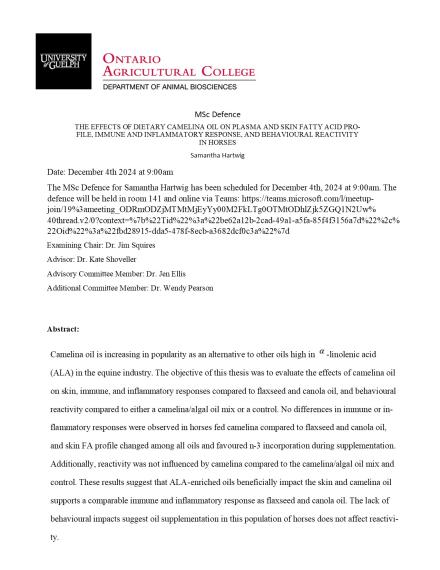Room 141 and Teams: https://teams.microsoft.com/l/meetup-join/19%3ameeting_ODRmODZjMTMtMjEyYy00M2FkLTg0OTMtODhlZjk5ZGQ1N2Uw%40thread.v2/0?context=%7b%22Tid%22%3a%22be62a12b-2cad-49a1-a5fa-85f4f3156a7d%22%2c%22Oid%22%3a%22fbd28915-dda5-478f-8ecb-a3682dcf0c3a%22%7d

THE EFFECTS OF DIETARY CAMELINA OIL ON PLASMA AND SKIN FATTY ACID PRO-FILE, IMMUNE AND INFLAMMATORY RESPONSE, AND BEHAVIOURAL REACTIVITY IN HORSES
Camelina oil is increasing in popularity as an alternative to other oils high in -linolenic acid (ALA) in the equine industry. The objective of this thesis was to evaluate the effects of camelina oil on skin, immune, and inflammatory responses compared to flaxseed and canola oil, and behavioural reactivity compared to either a camelina/algal oil mix or a control. No differences in immune or inflammatory responses were observed in horses fed camelina compared to flaxseed and canola oil, and skin FA profile changed among all oils and favoured n-3 incorporation during supplementation. Additionally, reactivity was not influenced by camelina compared to the camelina/algal oil mix and control. These results suggest that ALA-enriched oils beneficially impact the skin and camelina oil supports a comparable immune and inflammatory response as flaxseed and canola oil. The lack of behavioural impacts suggest oil supplementation in this population of horses does not affect reactivity.

